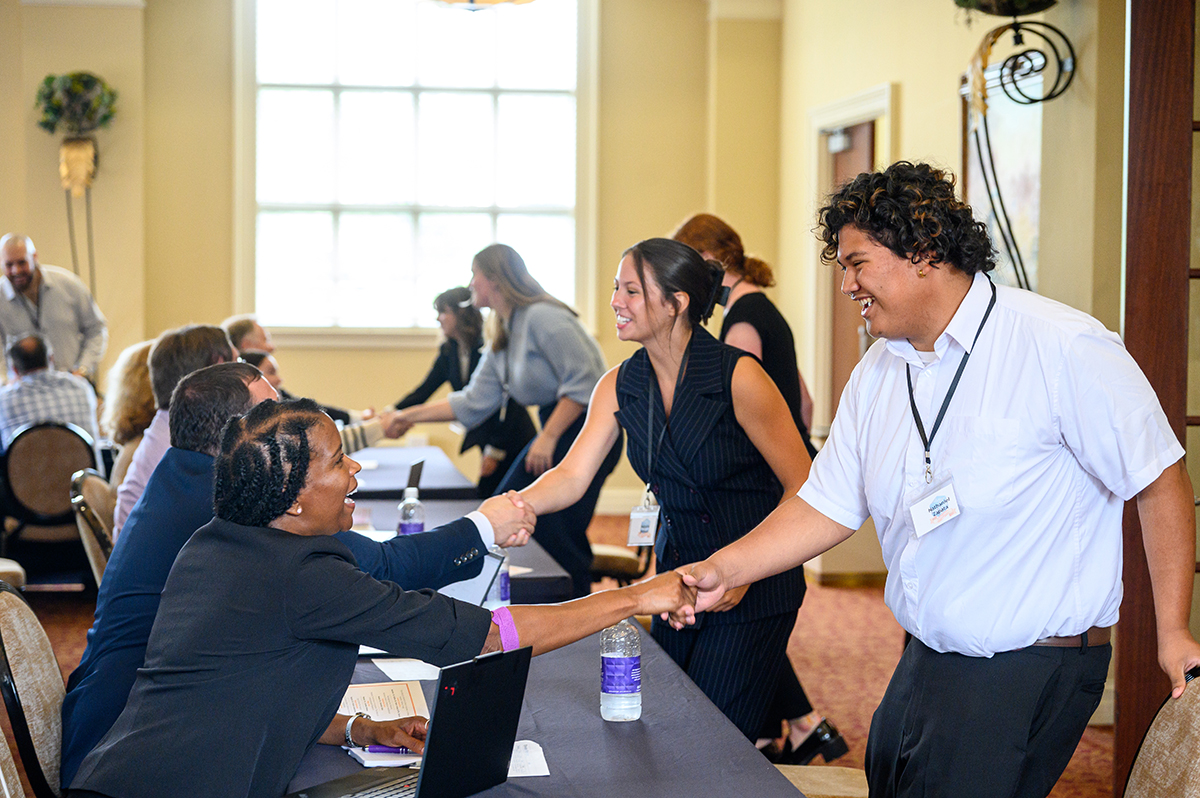Students who participated in High Point University’s Summer Research Institute took part in a competitive Elevator Pitch event on July 25 that included 90-second, one-on-one conversations between students and staff members from across campus. Pictured at right is Nathaniel Zapata as he shook hands with an HPU staff member before pitching his game design research project.
HIGH POINT, N.C., July 29, 2024 – Approximately 75 High Point University students recently wrapped up summer research projects that they had conducted with 40 faculty mentors. On July 25-26, students presented their findings through culminating events that focused on building presentation and communication skills.
The programs are SuRI (Summer Research Institute), SuRPS (Summer Research Programs in the Sciences), and SuRF (Summer Research Fellowship). Each program pairs students with professors who guide them through projects in a variety of fields.
Here’s a glimpse of the final research presentations and how students grew personally and professionally:
Student Researchers Present at Elevator Pitch Competition
Students who participated in SuRI took part in a competitive Elevator Pitch event that included 90-second, one-on-one conversations between students and staff members from across campus. The students’ goals were to quickly convey the results and the relevance of their projects to people who are unfamiliar with that area of research.
Dr. Joanne Altman, professor of psychology and founding director of HPU’s Undergraduate Research and Creative Works (URCW), led students through the speed dating-style format. Each of the 13 student researchers received feedback based on their pitch.
“When students participate in summer research, it gives them time to concentrate on the work they have chosen without the pressures of a regular semester,” said Altman. “The summer gives them the gift of time — time to work on their projects, time to resolve unexpected problems and even time to fail and regroup. The students learn most discoveries do not come easily, but that makes success in the end even more gratifying. Summer research helps students build resilience. We also have data to show that our SuRI and SuRF students improve in every skill set that we measure, and just in this short period of time.”
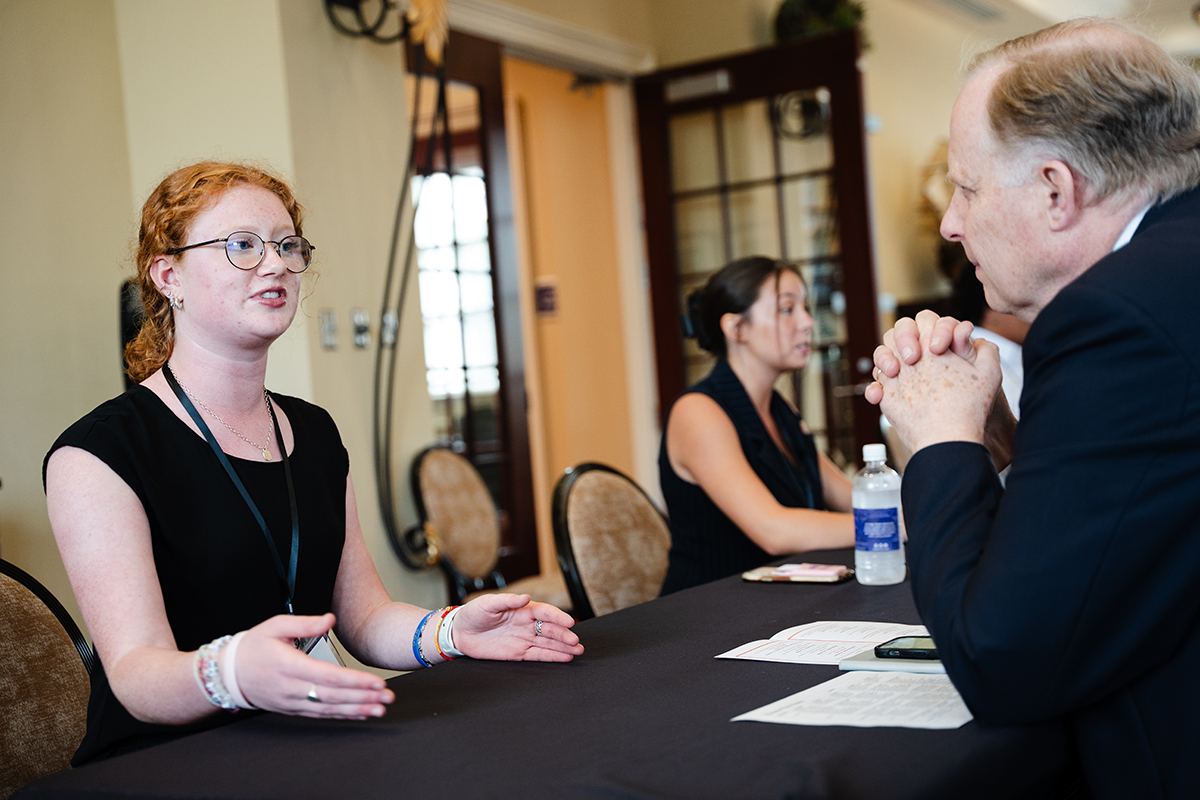
The judges selected Taylor Galavotti, a senior neuroscience and English double major from Lexington, Kentucky, as the winner of the elevator pitch competition. Galavotti worked in a SuRPS cancer cell biology lab after her freshman year, but she wanted to do research that aligned more with her interests. She found the right match by working with Dr. Kristin Ackerman in the biomedical science lab. Her research this summer focused on working with fish to test the effects of fluoride in tap water.
“I’ve learned a lot about the research process and everything that goes into it — all the ups and downs,” said Galavotti. “You may think of research as a super glamorous thing, but you learn how to really work hard through all the trials and tribulations. You also learn the importance of perseverance. For me, it’s been helpful in narrowing down what I want to do.”
Abby Fort, a psychology major from Baltimore, Maryland, explored a topic titled “Shaping Tomorrow’s Innovators: The Role of Undergraduate Research.” Although she had experience with oral presentations, she focused on simplifying her message in a short form to promote better understanding.
“One of the biggest challenges we’ve had in the URCW Program has been data analyzation,” said Fort. “I’ve been looking back at 8-plus years of data and seeing how undergraduate research has changed — especially with the COVID impact, but also how we’ve bounced back from it has been very important. A lot of the data we get are raw and clunky, so I’m learning how to simplify that for myself but also for my mentor, Dr. Altman, and other people because our communication styles and the way we organize are very different. Learning how to be more palatable to others is extremely important when it comes to data analytics and sharing.”
The concept of talking dogs inspired research by Jordan Destafino, a Class of 2027 neuroscience and electrical engineering major from Mocksville, North Carolina. His project involved building a brain scanner from scratch using a bicycle helmet and everyday components. A $500 Scholarly Interdisciplinary Research Grant (SIRG) he won through an earlier URCW competition allowed him to use lasers and artificial intelligence to develop a scanner to show body movement.
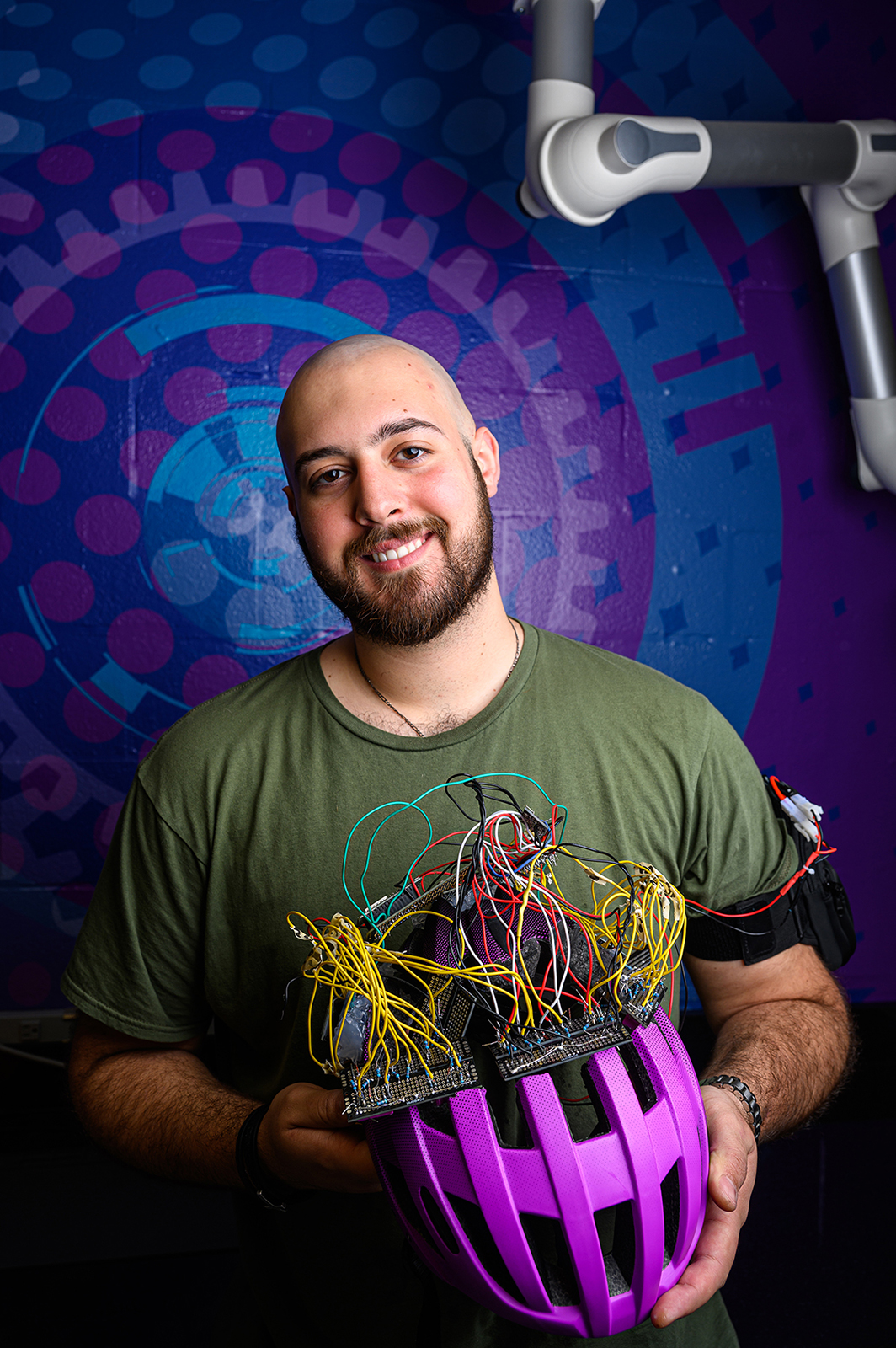
“The reason I went for this project is my goal of creating a device that will allow dogs to speak with us in English, but it’s my first time building a brain scanner so it made sense to develop a simplistic version for humans that would grow my skills and provide insight to the upcoming challenges,” said Destafino. “The knowledge I have gained is invaluable.”
One challenge Destafino faced while developing his budget brain scanner was that it doesn’t work with hair. Although he thinks future versions can avoid that, he shaved his head as a simple solution just to continue testing and refining the project.
“When it comes to research and internships, there are a tremendous number of opportunities for our students, specifically in engineering,” said Matt Eaton, engineering lab and Makerspace manager for the Webb School of Engineering. “When our students have the experience of summer research, they have a leg up in terms of getting other research opportunities or internships. It’s a huge differentiator in terms of having this support system within our university for our students to have funded research for their next steps, whether professionally or research in general. It can be very advantageous for students to get internships their junior year because they’re often offered a job and they have a job by the time they graduate, so that’s kind of the finish line.”
Students Share Their Research in the Sciences
Students in the SuRPS program presented their research in the Wanek School of Natural Sciences’ lobby and the Culp Planetarium. Fourteen faculty mentors and 37 students from various departments, including biology, chemistry, physics and electrical engineering, have worked in labs for the past eight weeks to test research. Projects ranged from micro- and molecular biology to fieldwork to nanotechnology.
“Participating in a summer research program like SuRPS is immensely valuable because it helps students develop their critical thinking and problem-solving skills, their creativity and their independence,” said Dr. Briana Fiser, interim dean of the Wanek School of Natural Sciences and chair and associate professor of physics. “Through SuRPS, they work closely with faculty on cutting-edge research, form community with fellow students and hear about research across the sciences from faculty at other universities through our SuRPS Seminar Series. All of these experiences enable our students to discover what they are excited and passionate about, which helps them identify possible future directions.”
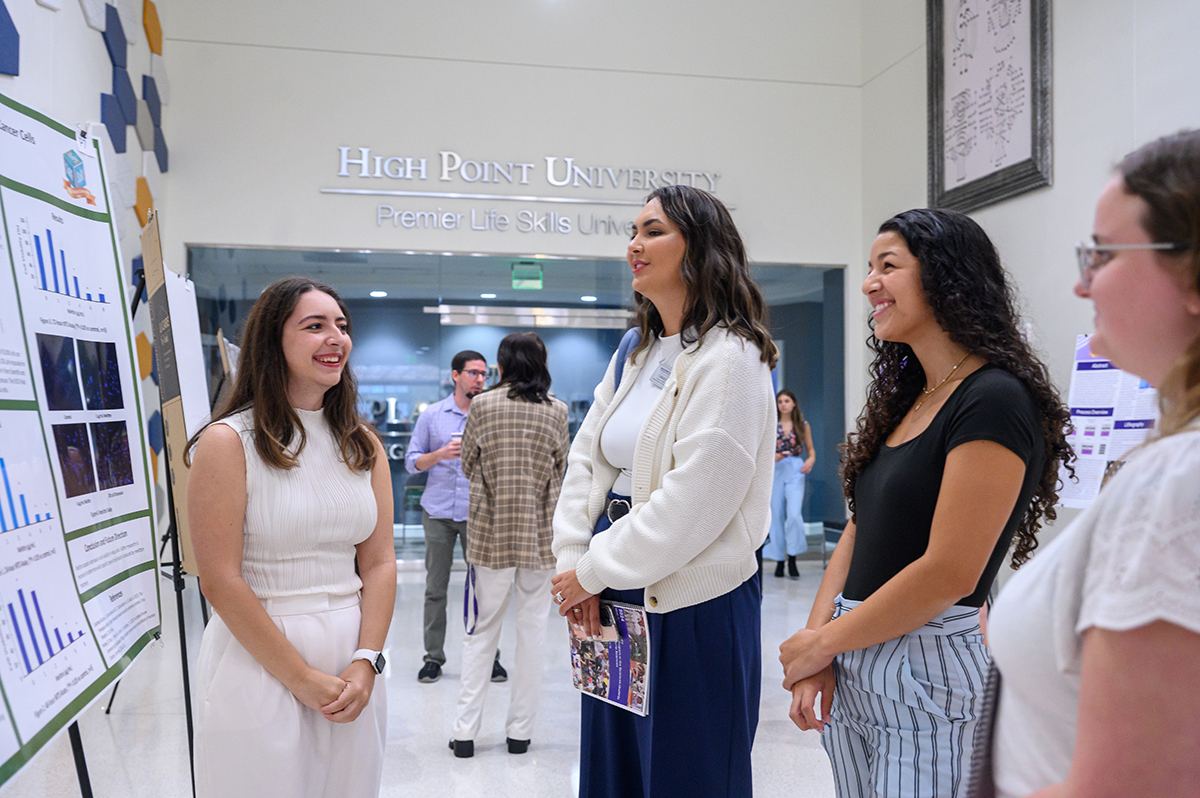
The program provides students an immersive experience that supplements what they learn during the academic year, said Dr. Kelsey Kean, assistant professor of chemistry and director of SuRPS.
“Summer research programs like SuRPS give students the unique opportunity to work side-by-side with HPU faculty in the research lab or in the field full time for eight weeks,” Kean said. “Students get genuine research experience, and this often shapes their educational and career trajectory. Gaining these experiences and building these relationships poises them to be even more successful when they leave HPU.”
Mack Fox, a junior neuroscience major from Bertram, Texas, said working on research this summer with Kean was an experience that confirmed her goal of pursuing a doctorate degree in neuroscience.
“I want to go directly into a neuro Ph.D., which will be tons of research,” said Fox. “I’m very blessed to have access to such intensive amounts of research as an undergraduate. Access to undergraduate research was actually the No. 1 reason I came to High Point University. I had tears on my last day in the lab because I feel like I thrive there.”
Caroline Paccione, a senior biology major from Windermere, Florida, expanded her experience in microbiology by researching the anticancer effects of melittin, the principal component of honeybee venom, on cervical cancer cells. She thinks it will help her become a more well-rounded candidate for graduate school in microbiology.
“My project this summer has focused on cancer cells and tissue culture, so getting that experience really helped me build not only my research skills but also my presentation skills,” said Paccione. “I got to learn so many new techniques and aspects of science since it is such a broad field of study. Through this summer, I gained more confidence in different techniques because microbiology develops a specific skill set compared to tissue culture.”
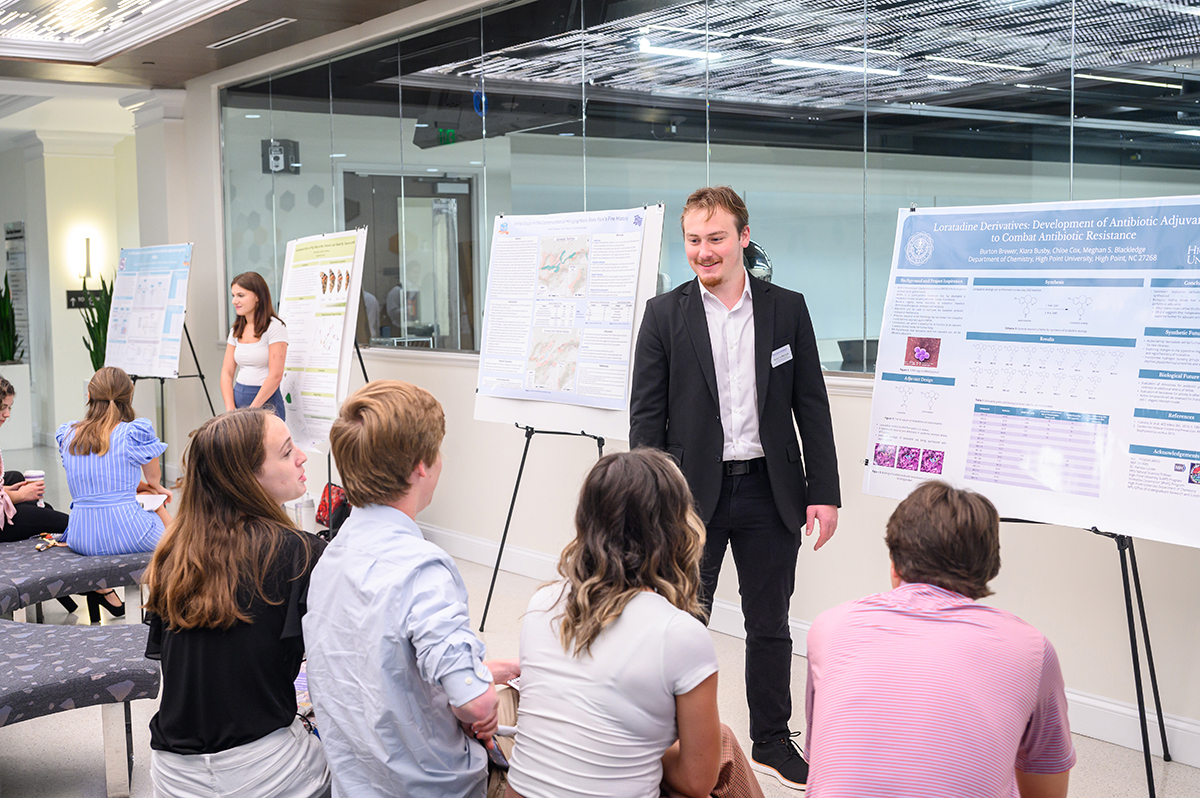
Burton Brewer, a sophomore chemistry major from Columbia, South Carolina, presented research he conducted with Dr. Meghan Blackledge, associate professor of chemistry and director of HPU’s Natural Sciences Fellows. Their work was titled “Loratadine Derivatives: Development of Antibiotic Adjuvants to Combat Antibiotic Resistance.”
“I’ve learned a lot about organic chemistry, how to do posters and scientific presentations, which will help me in the future,” said Brewer. “If I continue with the organic chemistry path, starting this early in my college years will definitely help me succeed in that later.”
The 2024 SuRPS keynote speaker was Dr. Alan Vasquez Soto, a Class of 2018 alumnus who earned B.S. and B.A. degrees in physics and computer science. Vasquez participated in the inaugural SuRPS program in 2015 and again in 2016. In May, he completed his Ph.D. in physics at the University of North Carolina at Chapel Hill, focusing on developing innovative telescope systems.
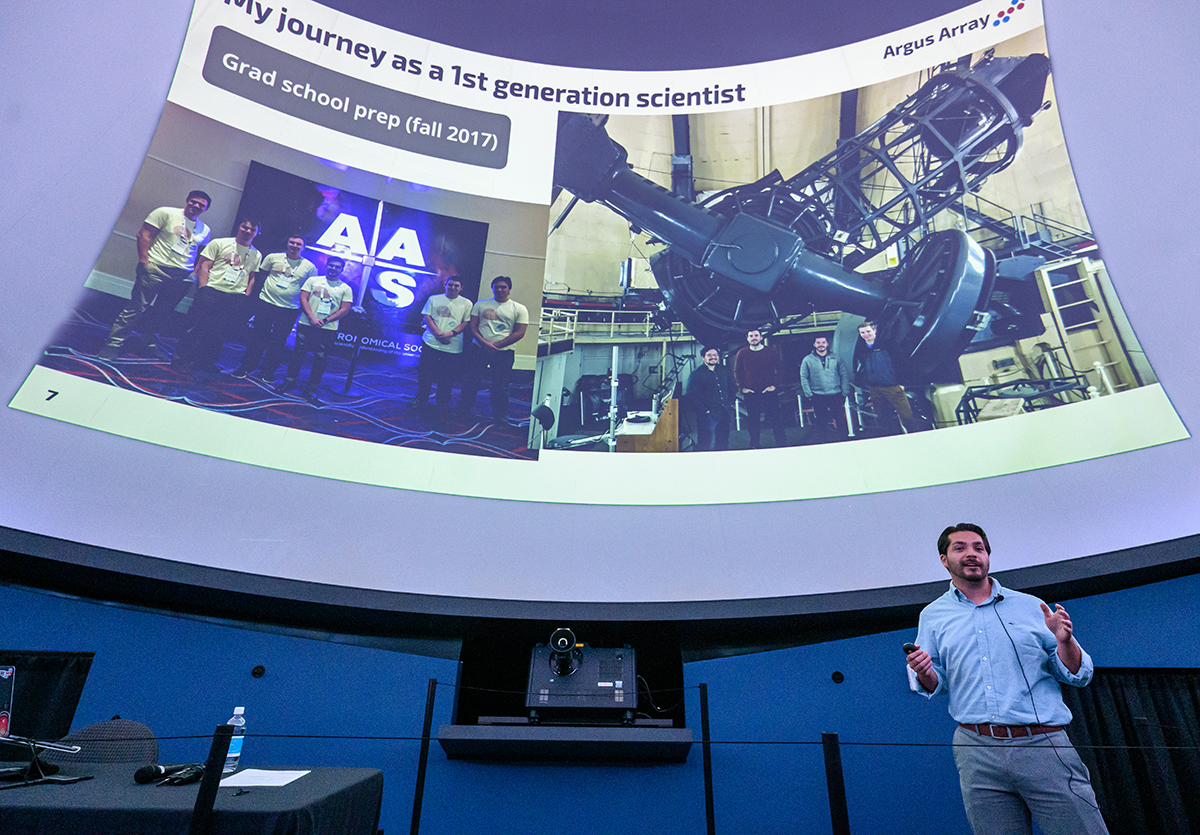
Currently a postdoctoral scholar at UNC-CH, Vasquez serves as project manager and systems engineer for the $24 million Argus Array project. The Argus Array is an all-sky system that multiplexes 900 telescopes onto a single mount. His presentation in Culp Planetarium was titled “Exploring the Fast Transient Optical Sky and Developing New Technologies for The Argus Array.”
“It’s great to see everybody here taking full advantage of the research opportunities you have at High Point University,” said Vasquez. “I think HPU does a really good job with presenting students with an enormous number of opportunities. There’s no shortage of opportunities you can take here if you’re willing to take advantage of them.”
